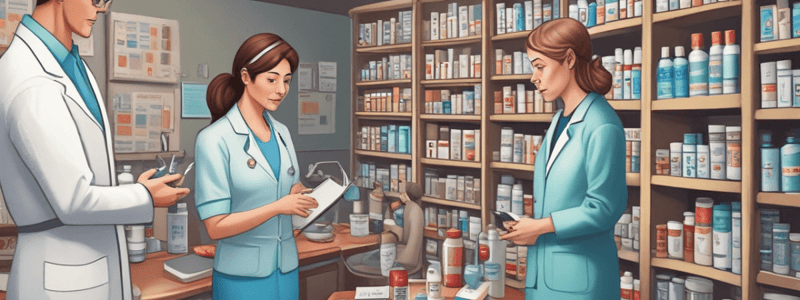Podcast
Questions and Answers
What is the purpose of a no-interruption zone (NIZ) in medication preparation?
What is the purpose of a no-interruption zone (NIZ) in medication preparation?
- To allow for patient evaluations during preparation
- To provide a distraction-free environment (correct)
- To ensure rapid medication administration
- To store medications securely
What should be verified before administering medications to a patient?
What should be verified before administering medications to a patient?
- The patient's allergies and reactions (correct)
- The patient's dietary preferences
- The patient's previous surgeries
- The patient's insurance details
What is a critical aspect of medication calculations?
What is a critical aspect of medication calculations?
- Utilizing advanced technology for calculations
- Relying on previous calculations as accurate
- Double-checking calculations for accuracy (correct)
- Trusting automated systems without verification
Which of the following is a recommended practice before drug administration?
Which of the following is a recommended practice before drug administration?
How should healthcare providers communicate with patients about medication administration?
How should healthcare providers communicate with patients about medication administration?
What should be done with patient identifiers before administering medication?
What should be done with patient identifiers before administering medication?
What is essential for ensuring accurate medication administration?
What is essential for ensuring accurate medication administration?
What is a recommended step before administering cardiac medication?
What is a recommended step before administering cardiac medication?
What is a work-around in the context of medication administration?
What is a work-around in the context of medication administration?
What should be done if a medication order is unclear?
What should be done if a medication order is unclear?
What is the primary purpose of using technology such as barcode scanning during medication administration?
What is the primary purpose of using technology such as barcode scanning during medication administration?
What should a healthcare provider do if a patient expresses concern about their medication?
What should a healthcare provider do if a patient expresses concern about their medication?
Which of the following activities is essential for preventing healthcare-associated infections during injections?
Which of the following activities is essential for preventing healthcare-associated infections during injections?
What is a high-alert medication?
What is a high-alert medication?
When should a healthcare provider verify the expiration date of a medication?
When should a healthcare provider verify the expiration date of a medication?
How should contamination of needles and syringes be prevented?
How should contamination of needles and syringes be prevented?
Which of the following is a recommended practice for performing hand hygiene?
Which of the following is a recommended practice for performing hand hygiene?
What is the consequence of overriding error messages in medication administration technology?
What is the consequence of overriding error messages in medication administration technology?
Flashcards are hidden until you start studying
Study Notes
Medication Administration Safety
- Prepare medications in a focused environment to avoid distractions; utilize no-interruption zones if available.
- Always verify patient allergies, documenting specific reactions and severity; use two patient identifiers for accuracy.
- Conduct thorough patient assessments prior to administering medication to ensure appropriateness of the drug, timing, and reason.
- Double-check medication calculations to prevent dosing errors that can jeopardize patient safety.
- Adhere to standardized procedures for all medication administrations; consult up-to-date evidence-based resources for current medication information.
Patient Communication and Clarification
- Engage with patients pre- and post-administration; explain medication purpose, dose, and considerations while encouraging questions.
- Never take shortcuts by "borrowing" medications; adhere to protocols to ensure safe administration practices.
- Always check expiration dates on medications before administration; expired drugs may lose effectiveness.
- Clarify any unclear medication orders with pharmacists or supervising nurses before proceeding.
Use of Technology in Administration
- Implement barcode scanning technology linked to the electronic Medication Administration Record (eMAR) for added safety.
- Understand that technological safeguards do not replace the "five rights" of medication administration; follow policies if error messages arise.
Reporting and Awareness
- Report all medication errors, near misses, and adverse reactions as part of quality improvement and safety culture.
- Stay vigilant about high-alert medications, which can cause significant harm, including anticoagulants, sedatives, and insulin.
Addressing Patient Concerns
- If a patient expresses concerns about a medication, halt the administration and address their worries before proceeding with the order.
- Review provider’s orders and notify the healthcare provider if necessary.
Infection Prevention during Parenteral Medication Administration
- Follow CDC guidelines on safe injection practices to prevent health care-associated infections:
- Perform hand hygiene before and after preparing and administering injections.
- Maintain sterility of needle and syringe, avoiding contact with non-sterile surfaces.
- Use aseptic techniques for skin preparation and equipment handling to reduce pathogen risk.
Studying That Suits You
Use AI to generate personalized quizzes and flashcards to suit your learning preferences.



